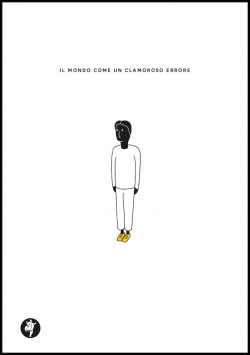Editorial
by Francesca Del Moro
In this poem from Alieni in Safari, a collection of poems on the theme of travel, Caterina Davinio’s slow and liturgical versification wraps us in the atmosphere of the city of Benares, soaked with the death of the Hindus who over the centuries have ended their lives here to escape Saṃsāra. Alessandro Silva mentions the suicide of captain Pringle Stokes to tell the story and explore the states of mind of a young sailor on board of the Beagle, scattering possible research inputs for the reader throughout his vivid and refined lines. With her usual attention to the meaning of the small details of daily life, Leila Falà captures the preparations for the departure in one of her “maps” and in the postcard selected for this issue she celebrates the fascination of the nights spent under the sky in three memorable lines. In her coarse and metaphoric poem, Eleonora Tarabella is a caged beast that is victim of the brutality of love and can be free again and avert the danger only by means of writing.
We left
by Caterina Davinio
We left.
India
Benares
The sweet smell
of death
like a sinuous
ribbon
in the hedgehopping mist,
water impregnates
the root
the souls
the bodies
reason, exhausted
by washed out roseate
colors;
that sickly
moist touch
washed
the stone
the flights of steps
the lanes
the rags,
oily and solemn
disordered and marshy
it gave us
its sacraments.
(Alieni in Safari, Robin 2016.
English Version by the author
and David W. Seaman)
Maps and Postcards
by Leila Falà
Maps: The list
Suitcase and beauty case, choosing
the list of things to take
all those that will be left behind
the things that will be forgotten
and the others,
which slipped in the pouch of their own accord.
They suddenly pop out of a pocket
signs or chances.
Postcard 6
The stars we slept under tonight
are definitely more than those five
of your super lux hotel.
Travelling at a gallop
by Eleonora Tarabella
A tiger leaps from your mouth.
It holds my shreds
in its jaws.
It spits them out:
uncertain love.
I then lull myself
in a corner of the cell:
I must hand out
the water bowl to myself.
Come here now, pen, and I’ll saddle you.
Be ready, paper, for my galloping.
When the steed runs,
the tiger is a soft toy.
It’s my gift for you,
if you come here and take it.
Everyone recounts his travelling through exotic lands
by Alessandro Silva
He fell from a deep depression
captain Pringle Strokes. And shot himself.
This called for a substitute
upon whom I inflicted, so he says,
the sharpest suffering of his life.
I was just a boy in his twenties,
an unremarkable soul full of good intentions,
hands as tools to remove
ribs of seashells and insect fossils
from the soil sticking everywhere. I was just
my own disgrace, with nothing
to wear, to use my father’s voice.
I was living on those desires whose tenacious
nerves collect each word
falling from lips and shape them into primordial
octopuses and salamanders, when soaked
in the first storm I measured up
the dreadful toughness of mainmasts
shredding the wind. Then came the fever and
I saw the mountainous land submerged by the sea
the dark wetness of coves and bays. Preserved
from ordinary time laws, with only portions
of vegetation between inlets and
bone conglomerate. Fire grain
of volcanoes from the creation era,
in that exact spot of the world I dreamed about you.
The snow hanging somewhere, like destiny.
Il mondo come un clamoroso errore
by Paolo Polvani
“It hurt me a lot, I saw / the world as a huge fail, / an enormous blunder, one only, / unparalleled mistake” the poet writes, after having briefly depicted a group of young women at work by the roadside. These girls belong to that kind of people who somebody may define as “the last”. People of whom Paolo Polvani captures the deepest humanity, the daily gestures, the episodes revealing the efforts, injustices and dangers which mark out their lives. Among them, the window cleaner Aziz who used to be an engineer in his country, the Romanian carer who smiles about the crazy old woman who she takes care of and who would prefer somebody from Russia, the man robbed by a brother at the soup kitchen for migrants, the beggar promising Our Lady of Romania outside the supermarket. Besides them, there are the elder people who bring their stories to the line where they stand waiting for their pension, the waiters with a sarcastic smile and a philosophical attitude, the girl who came from the Apulian countryside to work as a postwoman in Parma, and the eighty-year-old communist whose sons are indifferent to his ideals and who finds comfort in white wine. Group scenes and individual portraits alternate while the rhythm of poetry sometimes speeds up resulting in rhymed little songs and sometimes slows down to lengthy tracking shots: migrants and Italians are in the same boat, they potentially belong to the class whose existence the political and financial powers have been long trying to deny. Empathy and attention to detail prevent the author from creating stereotypes: every character is a unique individual, who we will keep in our mind and our heart, someone who by their mere presence denounce the unhealthy workings of our society. We should suspend judgment, silence the imperatives / of production, the watchwords of efficiency and profit. If we don’t react we will become complicit in all this, like the “Giuve” supporter who is indifferent to any disaster, provided that his beloved team wins.

